How Long Does a Federal Job Background Check Take?
Federal job background checks will usually take 2 weeks at a minimum. High-security clearance jobs will take up to 9 months to complete in some cases.
 Written by Background Check Repair
Written by Background Check Repair
Background Checks | June 27, 2024
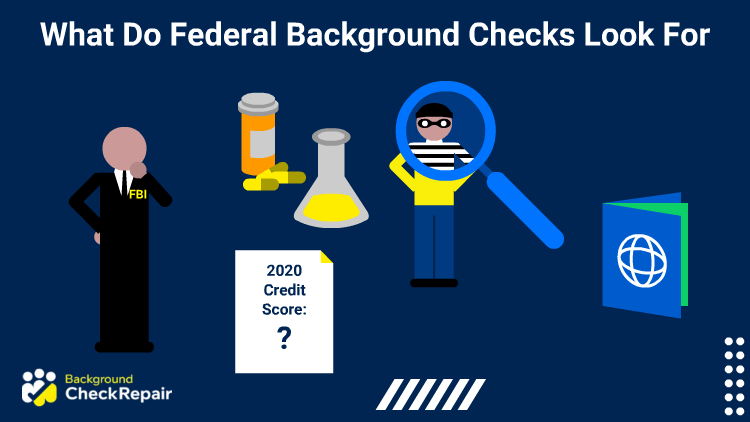
Table of Contents
Individuals who have applied for positions in the federal government may be wondering, what do federal background checks look for?
Although the check is different for every job, knowing the 14 types of checks that are used, and the 14 red flags that can trigger a failure, can help applicants pass their background check with ease.
First, learn how to get your own federal background report, then follow this guide to see exactly what kinds of background checks are run and the answer to what do federal background checks look for, in order to make sure that your applications will be approved.
Since federal background checks are unique in terms of what they hope to achieve when screening employees, many individuals who are wondering, “What do federal background checks look for?” may be curious about the specific kinds of checks that are performed and what information on these checks will stand out as red flags.
Since the background check is an issue of national security, the exact information that can disqualify an individual or perhaps stand out as a red flag is kept fairly secret. This is especially true of the jobs that have access to extremely sensitive information and require unique psychological testing and extensive reference checks to explore the individual’s past.
However, there are a few major red flags for all the basic checks that applicants are likely to encounter. Keep in mind that not every check will be performed for every job.
Having a bankruptcy on your record may be an issue for individuals applying for security clearance jobs but will likely not be a factor for someone applying for a job with the USPS.
| Type of Check | 14 Red Flags |
| Name and SSN Verification | Any discrepancies between the given name and SSN and what is found through the Social Security Administration |
| Local/State Criminal History | Any criminal charges of any kind, even those not resulting in convictions |
| National Criminal History | Any criminal charges of any kind, even those not resulting in convictions |
| Federal Criminal History | Any criminal charges of any kind, even those not resulting in convictions |
| Military Record | Dishonorable discharge or disciplinary action while an active military member. |
| Driving Records | Above average amounts of moving violations such as speeding citations, and reckless driving citations. |
| Credit History Check | Any bankruptcies or unusually high levels of debt. |
| Education Verification | Discrepancies between any certifications, degrees, or other educational histories that were given by the applicant and what was found during the background investigation |
| Employment Verification | Discrepancies between any job duties, positions held, or employers that were given by the applicant and what was found during the background check investigation |
| Drug Screening | Failing a drug test due to a positive result of a substance banned under federal law. |
| Conflict of Interest | Discovery of a conflict of interest that would be related to the job duties. |
| Public Trust Clearance | Anything that indicates a lack of integrity such as dishonesty, past employment disciplinary action, or information from the applicant’s past that was revealed while performing reference checks. |
| Mental Health Check | Any major mental health issues from the individual’s past that could make them a liability when it comes to sensitive information |
| Reference Checks | Anything that reveals the individual was untruthful, has ulterior motives or has poor integrity. |
There are many things that make the background checks performed by the federal government on any potential employee unique. Most people are at least somewhat familiar with the typical pre-employment background checks that are run on applicants for entry-level jobs. UPS Drivers, Home Depot employees, and other jobs in the private sector will all have similar background check procedures.
Usually, the check will be performed by a private background check service that will run a name-based criminal history check at the local and state levels, as well as a basic identity verification check through the Social Security Administration.1 This check takes a matter of days due to the fact that the background check service is simply entering a name into a series of databases and reporting the findings.
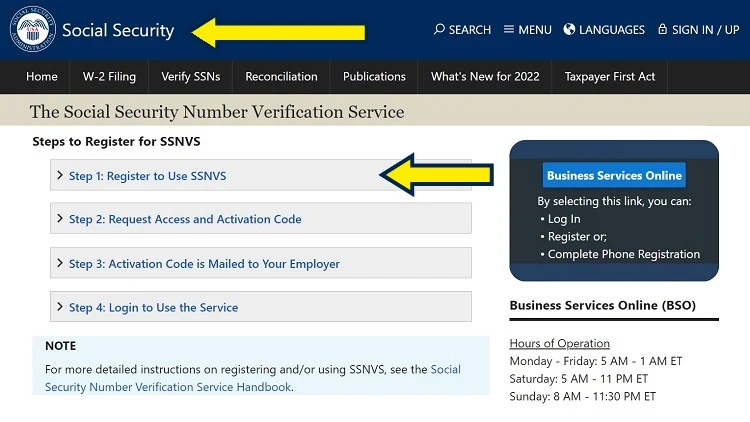
The Social Security Administration provides tools for users who want to verify social security numbers for business and hiring practices.
The primary goal of these kinds of checks is to eliminate applicants who pose a risk to the company in one way or another. This can be a safety risk to other employees or a risk that the individual may cost the company money through stolen merchandise, crashing the company car, or loss of business due to the company’s association with the individual.
Since the purpose of these background checks is to save the company money by minimizing potential lawsuits, the business will only spend enough money on background checks to save money, meaning certain individuals may slip through the application process and do something that results in a lawsuit.
Federal background checks are quite different both in terms of the primary goal of the check and the subsequent change in approach. Federal background checks are not performed to shield the federal government from potential lawsuits, rather the main purpose of federal employment background checks is for reasons of personal and national security, and these checks usually include a search for federal warrants.
For starters, this means that federal background checks are much more thorough. The United States Office of Personnel Management in conjunction with the FBI searches every major database when performing background checks.2,3
While many pre-employment background checks are name-based local checks, the background check for federal jobs includes state, local, national, and federal criminal history checks. In many cases, there will even be international checks that are performed through databases maintained by agencies such as INTERPOL.7
Besides the criminal history checks, certain jobs will be subject to additional checks that aim to limit the risk to national security. Many federal jobs will require security clearance due to having access to confidential and potentially harmful information. Individuals who apply for these jobs will undergo much more thorough checks.
Rather than only checking official information, the FBI and OPM will also search into the individual’s personal life to a certain extent, a social network presence investigation, an extensive reference check, and thorough verification of every piece of information that was included on the individual’s application. These high-security clearance jobs are also one of the few jobs that will often require a psychological evaluation, a background check for mental wellness, and various integrity tests.

(Image: U.S. Office of Personnel Management2)
This allows the federal government to get a better understanding of whether the individual holds any ill will toward the United States government, has sympathies with foreign adversaries, or if they do not have the integrity to have access to such sensitive information.
In short, while most background checks look for individuals who pose a financial risk to the company, federal employment background checks seek to determine an individual’s integrity by examining as much information as possible.
There are only small differences between the background checks performed for federal employment and the background checks for state employees. The main goal of both is safety and thus they perform their background checks in similar ways.
At a minimum, a state background check will include an individual’s entire criminal history information at the state, local, national, and federal levels. Beyond this, additional checks will be performed based on the job. For example, both law enforcement and teachers have background check procedures that are specific to their work.
Although there is a lot of possible information that can be revealed during the background check stage that could act as a red flag, not every red flag will result in immediate disqualification. For example, there may be some small conflicts of interest that may be overlooked due to the nature of the job having a low risk for corruption, or low-level misdemeanors that are overlooked for certain positions.
The list of conditions leading to an automatic job disqualification for government jobs is surprisingly short. Most of the information found on a background check is examined on a case-by-case basis due to the wide variety of jobs available in the federal government.
However, there are a handful of criminal offenses that will not be overlooked under any circumstances. These are laid out in detail by the Department of Homeland Security.4 Most individuals wondering: “What do background checks look for?” will likely not have to worry about any of the automatic disqualifying criminal offenses, since most of them are fairly serious and extreme crimes.
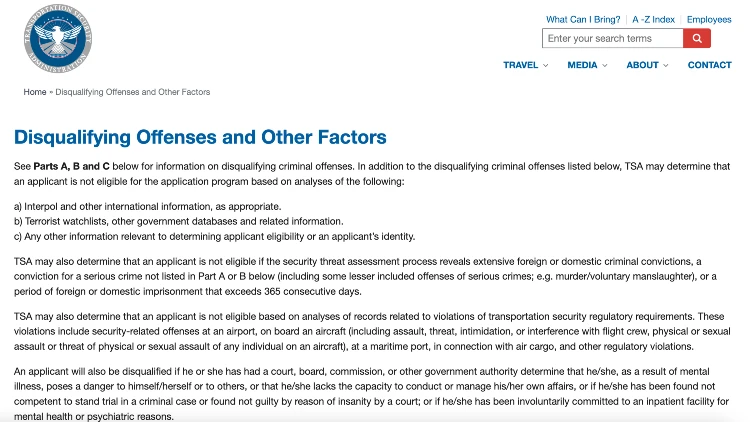
(Image: Transportation Security Administration4)
Amongst those listed by the DHS, are espionage, treason, sedition, and crimes involving the manufacturing, transportation, and sale of explosive devices. Essentially, the list provided by the DHS only lists the most extreme and obvious crimes that will be disqualifiers for jobs in the federal government.
Just what is the federal background check turnaround time? Even individuals applying for entry-level jobs in the federal government will find the background check to be the most extensive and take the longest of any background check they have ever had. While most private background check services perform name-based checks, of which the results are returned in a matter of days, federal checks take about 2 weeks at a bare minimum to complete.
Even the lowest level of checks will still require a fingerprint-based criminal history check. Whereas most background checks simply use the applicant’s name and SSN, information the employer already has, federal background checks for employment require applicants to submit fingerprints.
Oftentimes, the fingerprints must be taken at a specific location and subsequently mailed to the FBI offices. This mailing process alone adds several days to the process, and even in the case of the fingerprint information being submitted electronically, the process still takes several days before the FBI is able to add the fingerprints to their database and check the prints through the various criminal databases that they have access to.
Beyond entry-level jobs, the checks can take far longer than two weeks. Even jobs that require minimal security clearance will take several weeks and it will likely be over a month before the background check is officially passed. Besides the criminal history check, which takes two weeks, there are other checks that take far longer to perform as there is no database for the information and it must be checked manually.
Education verification and past employment verification can take several weeks as an individual must contact a variety of individuals from the applicant’s past to verify the information that was given. For the highest security clearances, even the individuals who are providing the references will likely be checked to a certain extent to avoid an individual putting a friend or family member down as a reference and telling them what to say.
Although most checks will only take a few weeks to complete, many jobs will require extremely extensive reference checks, often including individuals from the applicant’s past whom the applicant has not spoken to in years. Gathering a list of individuals that can be questioned, locating the individuals, and finding the time to interview them takes months. With some jobs performing reference checks on dozens of people, some of the most extreme background checks can take up to 9 months to complete.
After all the reference checks have been completed, there is often a stage in the background check process where the applicant will be interviewed several times on different matters. Rather than following traditional interview questions about the job duties, interviewers will ask questions about the individual’s past, beliefs, and various questions that are designed to perform a psychological evaluation of the individual.
Although most individuals will not have this experience, the more sensitive information that the individual will have access to and the higher the security clearance, the more likely the applicant will undergo background check processes that are unfamiliar to them.
What is the timeframe evaluated in a federal background check? Federal background checks go back indefinitely. Many individuals are under the impression that criminal history information only lasts 7 years, or at least only lasts 7 years for misdemeanor convictions. Although this is true for a handful of states that follow the 7-year rule, there are currently no federal laws that limit how far back a background check can go.
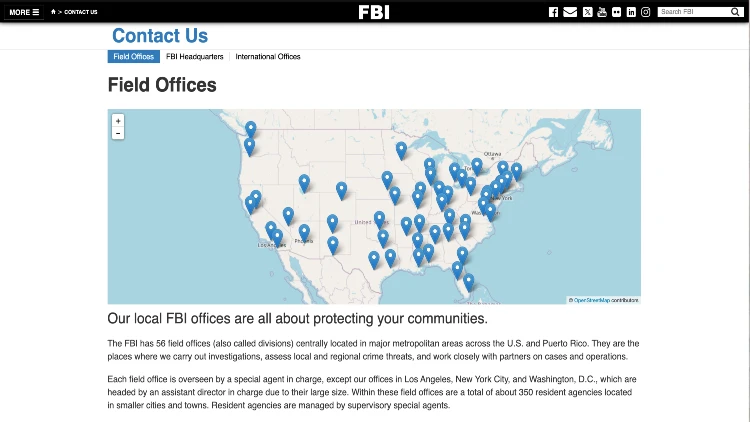
(Image: FBI3)
This means that all criminal history information for an individual’s entire life, even sealed information, will be available to the FBI and OPM during their investigation.
Can you pass a federal background check with a misdemeanor? Some individuals that are wondering what do federal background checks look for may have a felony or misdemeanor conviction on their record that they are worried about.
Although it is extremely unlikely to pass a background check for high-level jobs in the federal government with a misdemeanor on your record, many entry-level jobs will still hire individuals with misdemeanors.
This will largely depend on the job duties and the nature of the misdemeanor. Just like a private employer, what crime was committed will play a big role. For example, crimes such as theft are unlikely to be overlooked by individuals who are applying to jobs that have access to large amounts of cash or valuable goods.
Although it is possible to pass a federal background check with a misdemeanor on your record, the odds of passing one with a felony on your record are extremely unlikely.
Even the lowest level of jobs will have access to important or sensitive information so individuals with any kind of felony conviction are unlikely to pass the background check.
The background checks that are performed as a condition of employment for federal jobs will show an individual’s entire criminal history. This includes charges, arrests, and convictions for any crimes, anywhere in the country.
Even if the charges were dropped or the conviction was sealed, it will still show up on an FBI background check.
Most of the permanent disqualifying offenses listed on the Homeland Security list,4 involve extreme crimes such as terrorism, crimes involving explosives, murder, etc.
Besides the list of permanently disqualifying offenses the DHS also provides a list of offenses that are only temporary disqualifiers. Most of these are still related to felony charges such as rape, robbery, assault, fraud, bribery, extortion, and crimes involving immigration.
Besides these specific offenses, the DHS also lists that having an active warrant or having an indictment of any kind anywhere in the country will result in disqualification until the warrant is released or the indictment is dismissed.
The e-QIP background check investigation is simply the FBI background check that is performed as a condition for federal employment.5 E-QIP refers to the online system that the FBI uses to store and track background check applications.
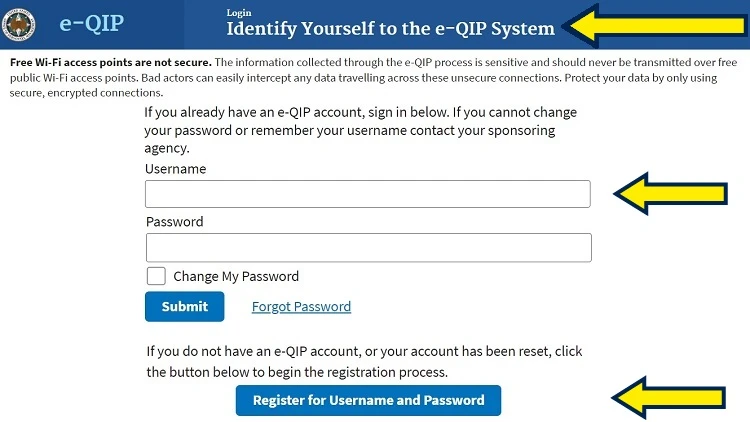
The E-Quip system is used for federal background checks.
Rather than filling out a paper form when a background check is needed, individuals can simply use the e-QIP system to do all this electronically. This not only helps with background checks being completed faster but also makes future checks quicker, such as the child care background check which must be completed every several years.
There are many reasons that a NACI background check could be failed. In most cases, it will have to do with the failure to list past criminal charges which are then found during the criminal history check.
No matter the reason, there will usually be an option to dispute the outcome of the background check. The specific employer within the federal government should be able to provide information on how to file an appeal.
Individuals wondering what do federal background checks look for may have something in their criminal history that they are unsure will be an issue.
One of the easiest ways to tell what will and won’t show up on a background check is to perform a background check on yourself. Although it is difficult to recreate all the elements of a federal employment background check, performing a thorough multi-state criminal history check is fairly easy and can be completed in minutes.
The easiest way to do this is to find an online background check service that can perform criminal history checks. Although most background check services will return all criminal history information available, it is worthwhile to double-check that the service searches both federal and state crimes in order to get the most similar results to what the FBI will uncover.
Another option is to pay for the FBI to perform a background check on you, which will be very similar to the federal employment background check. This is a great way to learn what is on your background check and allow individuals to fix any mistakes in their criminal history.
All background checks can be nerve-wracking and the federal employment background check is even more so, because of the 14 different areas they examine. However, anyone asking what do federal background checks look for will have little to worry about as long as they get a background check on themselves first and understand what will disqualify them from a federal position.
Federal job background checks will usually take 2 weeks at a minimum. High-security clearance jobs will take up to 9 months to complete in some cases.
Background checks for federal employment consist of extensive criminal history checks at the state, national and federal levels. There are also unique checks depending on the specific position such as drug tests, driving record checks, integrity tests, and extensive reference checks.
How hard a background check is for a federal job will depend on the job. The more sensitive the information the individual will have access to, the harder it will be to pass.
The background checks that are used for federal jobs are performed by the OPM, so only federal job applicants will be able to undergo a true federal job background check. However, the FBI performs the criminal history check portion of the background check and it is possible to pay to have an FBI Identity History Summary Check performed.6
Only individuals who wish to work for the federal government will need to undergo a federal employment background check. Jobs in the private sector may require individuals to undergo an FBI criminal history check, which is part of the federal government background check.
Most FBI background check disqualifiers involve extreme crimes against the United States such as treason, sedition, and espionage.
In most cases, failing the e-QIP check will mean the individual is disqualified for consideration for the position. However, individuals should reach out to the agency that requested the check to see if it is possible to find out why the check failed. In the case of investigations for certain clearance levels, they may not disclose the reason.
1Social Security Administration. (2022). Social Security. SSA. Retrieved October 8, 2022, from <https://www.ssa.gov/>
2U.S. Office of Personnel Management. (2022). OPM.gov Main. OPM. Retrieved October 8, 2022, from <https://www.opm.gov/>
3Federal Bureau of Investigation. (2016, May 3). Contact Us. FBI. Retrieved October 8, 2022, from <https://www.fbi.gov/contact-us/field-offices>
4Transportation Security Administration. (2022). Disqualifying Offenses and Other Factors. TSA. Retrieved October 8, 2022, from <https://www.tsa.gov/disqualifying-offenses-factors>
5Federal Bureau of Investigation. (2016, May 3). Privacy Impact Assessment Electronic Questionnaire For Investigations Processing (E-QIP). FBI. Retrieved October 8, 2022, from <https://www.fbi.gov/services/information-management/foipa/privacy-impact-assessments/e-qip>
6Federal Bureau of Investigation. (2016, May 3). Identity History Summary Checks (Rap Sheets). FBI. Retrieved October 8, 2022, from <https://www.fbi.gov/how-we-can-help-you/need-an-fbi-service-or-more-information/identity-history-summary-checks>
7National Central Bureau (NCB). (2022). International Criminal Police Organization. INTERPOL. Retrieved October 8, 2022, from <https://www.interpol.int/en>
We use cookies to ensure that we give you the best experience on our website. If you continue to use this site we will assume that you are happy with it